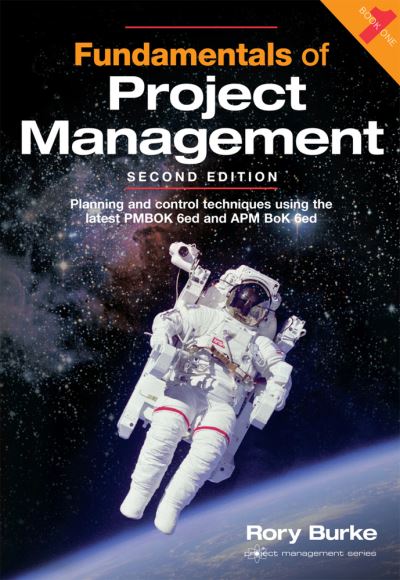
Currently Out Of Stock
Fundamentals of project management
Paperback
€36.18
Collect 108 Reward Points
- Currently Out Of Stock
- Book Synopsis
- Fundamentals of Project Management 2ed has been written for those new toproject management who need a broadbased introduction and explanation ofthe tools and techniques, terminologyand definitions associated with the bodyof knowledge, and need an explanationof the calculations used by the planningsoftware. At this level, it is essential the learners know how to perform all the calculations and administration functions. This book provides plenty of exercises and worked examples to guide them through the process. As a project coordinator or a project expeditor, the team members will be responsible for data collection, monitoring, processing, reporting and administration. This book will also be of value to contractors, suppliers, consultants and other stakeholders who participate in projects and need to be aware of the project management process. Author's Note: Fundamentals of Project Management (second edition) has been updated and comprehensively expanded to include the latest planning and control techniques as outlined in the PMBOK 6ed, APM BoK 6ed and the planning software. This successful book has become the international standard text for teaching project management theory and techniques. This book is ideal for project managers who need to understand the basic principles and techniques so that they can plan and control their projects effectively. Team members working through the project office who perform a range of administration functions will also benefit, as will contractors and suppliers who participate in projects. Education and Professional: This book has been designed to support a range of undergraduate, postgraduate and short courses together with preparing project managers for professional certification (PMP). The text is supported with plenty of worked examples, exercises and case studies to help explain how to calculate and apply the special project management tools and techniques. Body of Knowledge Mapping: A special feature of this book is the body of knowledge mapping at the beginning of most chapters. The chapters are mapped to the relevant body of knowledge areas and definitions. This will help course directors designing new courses and learners preparing for their PMP certification based on the latest body of knowledge. Learning Outcomes: The aim of this book is to help project managers and project team members acquire the competency and knowledge they need to calculate and process a comprehensive range of project management planning and control tools and techniques. It will also explain the content of the body of knowledge to give a clear understanding of its content, terminology and application. New Chapters: The new edition includes a number of new chapters, which are listed below. ManagementTypes of Management is a new chapter which has brought together a range of management styles that the project manager and team members might have to interface with during a project. Two of the new management styles in this chapter are the increasingly popular Agile Project Management and Sustainable Project Management. Role of the ProjectRole of the Project Manager is a new chapter to reflect a new area in the body of knowledge. This chapter outlines the roles, duties and responsibilities of the key players; project manager, team members, project sponsor and steering board members. ProjectProject Leadership and Entrepreneurship is a new chapter thatoutlines how leadership traits and entrepreneurship traits (spotting andexploiting opportunities) can be applied to the project environment.A special feature of this chapter is a table of comparisons betweenmanagement, leadership and entrepreneurship styles. Project Methodology is a new chapter that shows how the project phases, project processes and project plans can be unified and interlinked through a systems approach to managing projects. Project SelectionProject Selection is a new chapter that clearly explains how to calculate the following; payback period, breakeven point, return on investment (ROI), internal rate of return (IRR), discounted cash flow (DCF). Project CharterProject Charter and Closeout Report is a new chapter which explains how to develop and produce these structured documents that are used to formally initiate and close projects. MethodProject Build-Method is a new chapter that explains how to produce this special document that outlines how to make the project after taking into consideration any special circumstances, boundaries and constraints. Project Acceleration and Fast-Tracking is a new chapter that explains how to apply these special project compression techniques to complete projects on time. Support Resources: A comprehensive set of support of resources are available for lecturers (instructor's chapter guide and PowerPoint slides) and for students (MCQs). These can be obtained through our website (www. burkepublishing.com) I am greatly indebted to my network of useful contacts whose knowledge and insight have helped to shape the content and direction of this book; with a special thank you to: Foreword: Steve Barron for his inspirational foreword. Proof Reading: Sandra Burke and Jan Hamon for their eagle eyes. Cover: Simon Larkin for updating the cover. Rory Burke, FRGS Gulf Harbour
- About The Author
- Rory Burke founded Burke Publishing in 1988 when he wrote his first book on Project Management. Rory has an MSc in Project Management (Henley) and degrees in Naval Architecture (Solent University) and Computer Aided Engineering (Coventry). He has worked internationally on capital projects. Rory is an author, consultant and visiting lecturer to universities internationally.
- Product Details
-
- ISBN
- 9780994149213
- Format
- Paperback
- Publisher
- Burke Publishing, (09 November 2017)
- Number of Pages
- 429
- Weight
- 748 grams
- Language
- English
- Dimensions
- 250 x 165 x 23 mm
- Series:
- See all books in this series
- Categories: